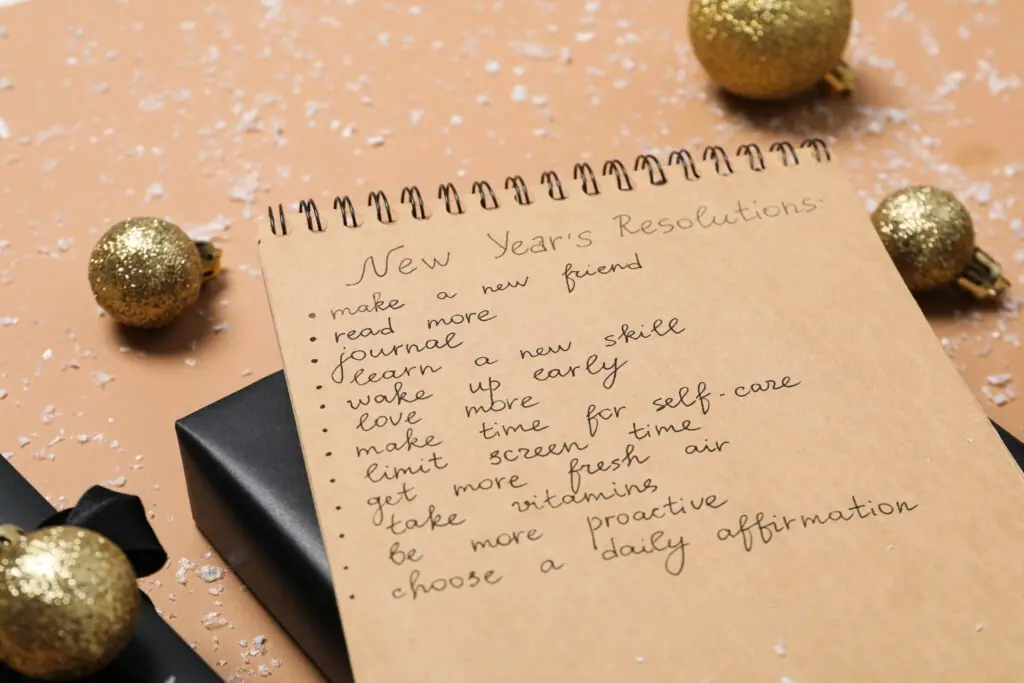As the calendar flips to a new year, millions of people around the world make New Year’s resolutions. It’s a tradition that aims to better yourself through fresh starts and self-improvement. Yet, despite the optimism, many of those resolutions drop off before the year even begins. This year, instead of making vague goals to “be better” or “eat healthier,” consider taking a more structured and measurable approach. Setting achievable goals and tracking progress can transform good intentions into actual change. Here’s how you can make your New Year’s resolutions stick.
Why Do We Make New Year’s Resolutions?
At the heart of New Year’s resolutions is the desire to improve ourselves, whether that means becoming healthier, learning a new skill, or breaking old habits. The tradition has deep roots, dating back to the ancient Babylonians, who would swear their loyalty to a new king or reaffirm their loyalty to the current king, they would also make promises to the Gods to repay their debts and return anything that they had borrowed.
However, the excitement and motivation that come with a new year can often fade when faced with the day-to-day challenges of life. This is where goal-setting comes in, it provides a structured framework for turning resolutions into achievable actions.

Making Specific and Measurable Goals
One of the main reasons New Year’s resolutions fail is that they are often too broad or vague. “Get in shape” or “save money” are a good thought, but they lack clear steps or milestones. When you don’t have specific, measurable goals, it’s easy to lose focus and motivation and many people end up giving up their resolutions because of this.
Instead of making these promises, break your resolutions down into smaller, more manageable goals that can be measured. For example:
- Instead of “get in shape,” say “I will work out three times a week for 30 minutes.”
- Instead of “save money,” say “I will save £200 per month by cutting back on takeaways and eating out.”
The more specific your goal, the easier it will be to track progress and stay motivated.
The Power of the SMART Goal Framework
To take your goal-setting to the next level, consider using the SMART framework. SMART stands for:
- Specific: Clearly define what you want to achieve.
- Measurable: Ensure your goal has quantifiable criteria so you can track progress.
- Achievable: Set a goal that’s realistic and attainable.
- Relevant: Align your goal with your broader values and objectives.
- Time-bound: Set a deadline or timeline for completion.
By applying the SMART criteria, you’ll have a clearer route to follow, making it more likely you’ll succeed. For example, instead of saying, “I want to read more books,” a SMART goal would be, “I will read 12 books this year, averaging one book per month.”

How to Stay on Track
Once you’ve set your SMART goals, the next step is staying committed. Achieving your goals requires more than just setting them — it takes action and consistency. Here are a few strategies to help you stay on track:
-
Break It Down
Large goals can feel overwhelming, but if you break them down into smaller, actionable steps, they’ll feel more manageable. If your goal is to run a marathon, start by running a mile, then increase your distance gradually each week.
-
Set Milestones
Milestones are mini-goals that help you track your progress and celebrate small victories along the way. For instance, if your goal is to save £6000 by the end of the year, a milestone could be saving £500 every month.
-
Stay Accountable
Tell someone about your goals or find a partner who is trying to stick to a similar resolution, this way you can motivate each other. When you know someone else is tracking your progress, it can be a powerful motivator. Alternatively, use apps or journals to track your daily or weekly progress, which will provide a reminder of your goal and how to stay on track. For example, I use the fitness website/app “Caradoc Conditioning” to track my gym performance and to remind me of what my daily goals are.
-
Be Flexible
Life happens. Sometimes, things don’t go according to plan, and that’s okay. Being flexible allows you to adjust your goals when necessary, but don’t use setbacks as an excuse to abandon them entirely. The key is to stay focused and keep moving forward, even if it means revisiting your plan.
-
Reflect and Reevaluate
Set aside time weekly, monthly, quarterly, or whatever suits you, to evaluate your progress. Ask yourself what’s working, what’s not, and whether your goals still align with your values. Reflection helps you stay connected to your purpose and adjust your actions if needed.
Mindset Matters
Perhaps the most important factor in achieving your resolutions is mindset. Change doesn’t happen overnight, and progress may not always be consistent. Having a growth mindset means embracing challenges and viewing setbacks as learning opportunities.
It’s also helpful to understand that small, consistent actions lead to big results. Instead of focusing on the end goal, focus on the process. Whether it’s getting a little fitter each day or reading a few pages of a book each evening, consistency is the key to long-term success.

Common New Year’s Resolution Downfalls — and How to Avoid Them
Even with the best intentions, many people fall into the same traps year after year. Here are some common mistakes and how to avoid them:
-
Setting Unrealistic Goals
If your goal feels like a massive leap from where you are right now, it’s important to reconsider. Break down big goals into smaller steps and set realistic expectations for yourself. Rome wasn’t built in a day, and neither is lasting change.
-
Forgetting to Prioritise
We often set multiple goals at once, but it’s easy to become overwhelmed and lose focus. Try prioritising your most important goal for the year and commit to that one before overdoing it and losing track completely.
-
Not Being Specific Enough
As mentioned, vague resolutions are hard to stick to. Make your goals clear and actionable. The more specific you can be, the easier it will be to create a plan and measure your success.
-
Giving Up Too Soon
Progress often happens slowly, and setbacks are inevitable. The key is persistence. Don’t give up just because things get tough. Adjust your strategy if needed, but keep your eye on the prize, and remember why you started.
Have you also read these articles?

